The Race for Congress
Nine Candidates Vie for the 24th District Seat

After nearly two decades, Lois Capps, the nicest member of Congress, is stepping down, setting off a tumultuous race that has been anything but nice. The 24th Congressional District, which encompasses the counties of Santa Barbara, San Luis Obispo, and a slice of Ventura, now has nine candidates vying for the office.
Of the nine, five are outsiders, all raising relatively little money and securing fewer endorsements. The top four, however, two Democrats and two Republicans, have enough cash and support to put up a strong fight. Adding to the drama is California’s open primary system, which allows the top two vote getters in the June 7 election to be from the same party.
Between the two leading Democrats, the campaigns have been increasingly nasty. County Supervisor Salud Carbajal and City of Santa Barbara Mayor Helene Schneider — once rising stars and liberal allies —barely look at each other in public gatherings.
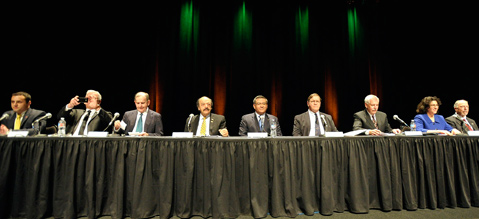
As for the Republicans, Katcho Achadjian, a two-term assemblymember and 12-year San Luis Obispo County supervisor, has long been the establishment’s pick. But Justin Fareed, an ambitious, energetic 27-year-old with deep pockets who ran a quixotic race two years ago against Lois Capps, ignored the old guard’s wishes and took on the party favorite, Achadjian.
The five lesser-known contenders — Bill Ostrander, Matt Kokkonen, Benjamin Lucas, John Uebersax, and Steve Isakson — might lack money but are rich in personality, brashness, and stamina. Ostrander emerged as the Bernie Sanders candidate, even making bumper stickers that say, “Feel the Bill.” Though he objects to the label, Kokkonen functions as Donald Trump’s alter ego for harsh remarks he made about “illegal aliens.” He went so far as to question Carbajal’s legal status but got no traction.
Notably, three of the candidates are immigrants — Kokkonen (Finland), Carbajal (Mexico), and Achadjian (Lebanon). The three have strikingly different positions on immigration. The national issue is significant in the district as it is home to tens of thousands of undocumented people.
For a decade, the 24th Congressional District was so gerrymandered that it was known as the “Ribbon of Shame” and gave Dems a 22 percent advantage in registered voters. In all of Capps’s nine races, just four were considered competitive. Today the Democrats only hold a 3.5 percent lead among registered voters. This makes the 24th one of the most competitive House races in the country.

spanning Santa Barbara County, San Luis Obispo County, and a small piece of Ventura County — an open seat
for the first time in nearly 20 years.
Not surprisingly, Democratic committees have spent more than $600,000 to support Carbajal. The National Republican Congressional Committee dropped $220,000 on attack ads against Carbajal. Citizen Super PAC, a political action committee that functions like a crowdsourcing platform, spent roughly $275,000 on ads supporting Fareed. Kokkonen, a financial planner, gave $200,000 to his own campaign. Meanwhile, Ostrander — the political finance reform candidate — denounced money’s impact on all contests. But the cash continues to flow.
Anyone paying attention — at all — has seen the political TV ads bombard the airways and mailers fill mailboxes: The ad attacking Achadjian for being “terrible for women”; the TV ad bashing Carbajal for approving a pay raise for the Board of Supervisors while lambasting Schneider as a universal-health-care advocate; the mailer likening Ostrander to Sanders. But these depictions offer only a glimpse of who these people really are.
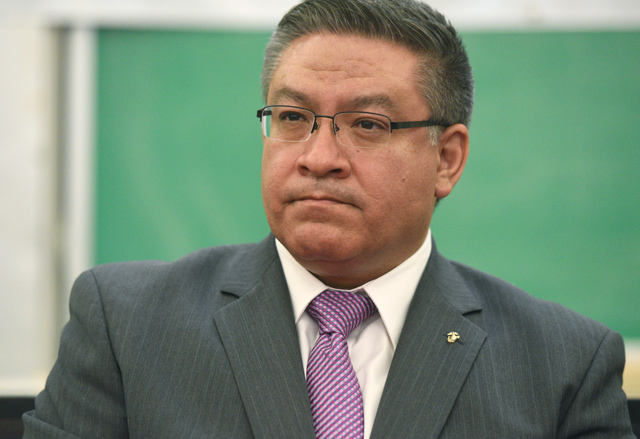
Salud Carbajal
When Salud Carbajal was 5, he, along with his seven brothers and sisters, took a bus from their Mexican village to the small town of Bagdad, Arizona, where his father worked as a unionized copper miner.
Three years later, Carbajal experienced serious trauma when he found the body of his older sister who had just committed suicide. “I feel like I’ve never really dealt with that through my entire life,” the now 51-year-old supervisor said.
Years later, after his father was laid off, the family moved to La Colonia, the Oxnard barrio where his father worked in the fields. “To me it was like moving to the big city,” Carbajal remembered.
“He could have easily been caught up with the gang culture, but he wasn’t,” said Ross Fontes, now an Oxnard College counselor who met Carbajal when they were both in the 9th grade. Instead, Fontes remembers him as a talker — “a real rah-rah kind of guy” — who made deals with his teacher to bring in candy for the whole class if they got good grades. Carbajal did well, got into UCSB, and joined the Marine Corps Reserve, following in the footsteps of his older brother, Emmanuel.
After graduation, Carbajal eventually landed a job at the county’s Public Health Department, where he caught the eye of the late Naomi Schwartz, the legendary 1st District supervisor, eventually becoming her chief of staff. Though he once entertained running for City Council, Schwartz encouraged him to go for county supervisor after she retired. Many credit her for launching his political career.
Carbajal touts his prowess at bringing opposing sides together, developers and angry neighbors, for instance. And as a result, he often makes friends from both sides of an issue. He even garnered support from hard-core Republican Pat Nesbitt, a confrontational Summerland resident. On May 19, Nesbitt even held a fundraiser for Carbajal, who missed a debate at San Marcos High School to attend, composed of a political mix of people; Carbajal embraced the “politically diverse crowd.” Though his fundraising skills are enviable — he has raised more than $1.9 million so far, he denies being influenced by the money: “I’ve never hesitated to vote against somebody who has been a supporter.”
But not even Carbajal could smooth out every polarized issue. A longtime supporter of open talks with the Chumash, Carbajal once sided with three fellow county supervisors by opposing the tribe’s application to expand its reservation borders. “There’s got to be some give,” he once begged an anti-Chumash expansion audience, hoping to find a compromise, but all he managed to do was annoy just about everyone.
Among his achievements, Carbajal expanded children’s health care, relaunched the truancy program, and successfully led opposition to Supervisor Peter Adam’s controversial maintenance proposal, Measure M. But Carbajal, one of the only Latino elected officials on the South Coast, did not take a firm position on the city’s gang injunction until the very last minute. Nor did he come out in support of Measure P, the ban on unconventional oil production, until three weeks before it went down to defeat in the 2014 election. “Are there a few issues I waited a little bit longer to get more information to satisfy myself?“ he said, “Absolutely.”
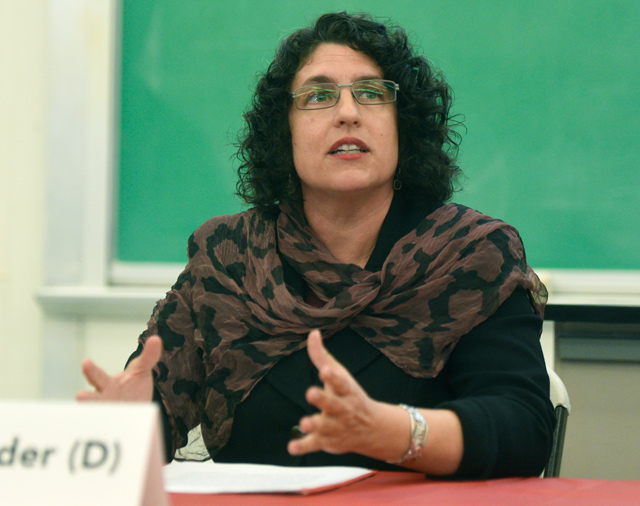
Helene Schneider
Helene Schneider came of political age in the ’80s in New York City, where she was named head girl at her private high school, sat on the student council, and was class valedictorian. Asked if she was a marching-in-the-streets type, the 45-year-old said, “a little,” but she “had high school friends who were much more politically active.”
Her parents divorced when she was a baby, and she lived with her mother in a rent-controlled apartment on the Upper West Side. The women in her family were Democrats; the men tended to lean Republican. But she was greatly influenced by her favorite uncle, a strong Dem and political science PhD, especially when she would listen to him arguing over politics with her grandfather, a lifelong Republican.
Two weeks after graduating from Skidmore College — a private liberal arts school — Schneider moved to Santa Barbara with her then-boyfriend, now ex-husband. She worked as the human resources director of Planned Parenthood, and eventually joined with other activists who were organizing to help elect more women into political office. One outcome of this was the forming of the now highly influential Women’s Political Committee, which Schneider chaired from 1999-2000. Through their efforts, the first women were elected to the County Board of Supervisors in 1989.
The Committee also supported the successful campaigns of Susan Rose and Hannah-Beth Jackson among many others — including Schneider.
In 2003, she ran for City Council, along with Das Williams, now a termed-out State Assemblymember running for Carbajal’s seat as 1st District Supervisor. Both Schneider and Williams were up-and-coming young guns of the Democratic party; both championed affordable housing, the living wage, and anti-gentrification in the Funk Zone. They both won.
On the council, Schneider was inclusive and thoughtful, and encouraged public participation, said former City Councilmember Grant House, who is supporting her. House has a clock hanging in his kitchen Schneider gave him that says, “Well-behaved women never make history.” Hardworking and intelligent, she nevertheless does not hide her fun-loving, outgoing nature. It turns out she can really belt a tune and often volunteers to do so at benefits. Three weeks ago she sang karaoke at Dargan’s Irish Pub & Restaurant for the National Kidney Foundation’s Karaoke for a Cause.
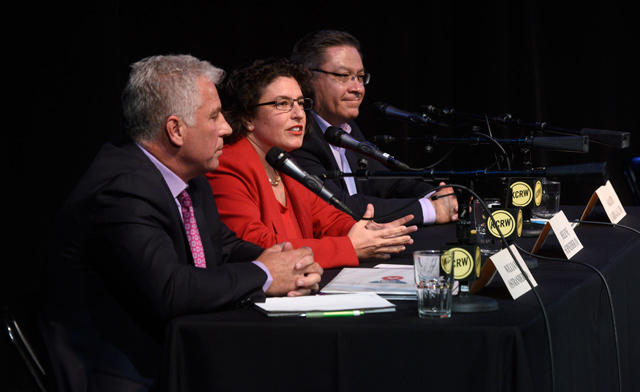
As mayor, Schneider has at times been unapologetically bold. She fought the development of 25 homes on the 14-acre parcel Veronica Meadows, restarted the desalination plant, and led the unanimous adoption of the general plan.
Not everything ran smoothly. In 2007, as a city councilmember, Schneider pushed for the Light Blue Line, an environmental art project proposing to paint a 1,000-foot strip on streets throughout the city, showing where the waterline would rise when the ice caps melted from global warming. Worried about negative impacts to housing prices, realtors and homeowners caused a near riot. Crowds packed the usually dreary Historic Landmarks Commission meeting — and the applicants ultimately dropped the project. Even some of her supporters thought she had rushed into the project. Reflecting on the matter, Schneider laughed, “I want to raise awareness about city level rise … and I definitely raised the awareness of city level rise.”
Though perhaps insignificant, the Light Blue Line does serve as an illustration of Schneider’s occasional trait of neglecting to line up support before charging forward. A more serious example of this was how she launched her four-part voter sales tax initiative, Invest in Santa Barbara, which had great potential but had not gotten influential stakeholders to buy into the different tax proposals. The initiative never got off the ground. She defends her approach, however, by saying she wanted to take it to the voters first and that many people appreciate how she gave the ideas a hearing. “You can never hit a homerun,” she said, “if you don’t get up to bat.”
It surprised many that the few women’s political groups that had supported her in earlier races did not endorse her for this congressional campaign. State Senator Jackson proved to be one of the few. Democratic Women endorsed Carbajal, and the Women’s Political Committee did not have enough votes to endorse any candidate. Emily’s List, the pro-choice organization dedicated to electing women, also opted to stay out of this race.
Longtime Democrat E.J. Borah, one of Schneider’s chief backers, scorned Carbajal’s tendency to “work the room.” “She doesn’t do that,” she said. “I think one of her greatest assets is her independence. … She’s not as politically savvy as Salud. She doesn’t play the game. And it’s not because she doesn’t know how.”
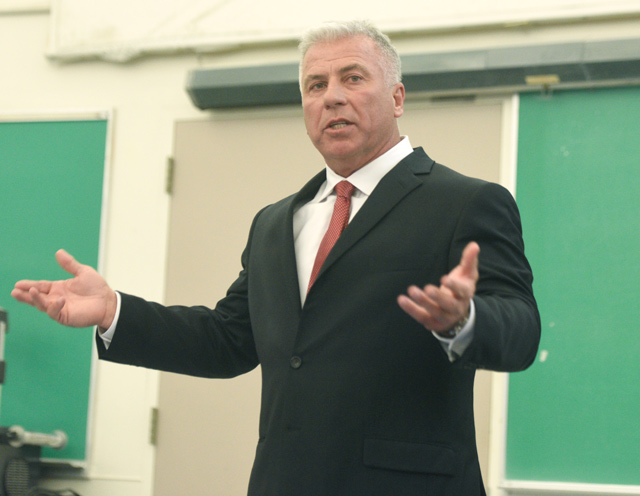
Bill Ostrander
Bill Ostrander, 56, was once an actor, where he certainly learned to project his voice. He grew up on a farm in Indiana — he once cried for three days after his pig was killed at a fair — but left to make films in Hollywood because of his “compassion and curiosity.”
Ostrander, self-described as “very progressive,” only joined the Democratic Party last March because it is a “suicide mission” to run for office as an Independent. At debates, he often stands, practically yelling at the crowd, usually about his main issue: money in politics.
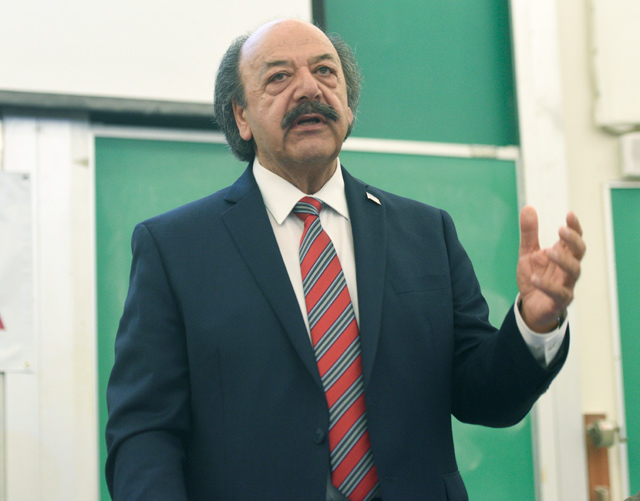
Katcho Achadjian
By all accounts, Katcho Achadjian is a nice man. He grew up in Lebanon, where his parents settled after surviving the Armenian genocide. His father began work by unloading boxes in a grocery store but eventually was able to buy and expand the business. In the early ’70s, at age 19, Achadjian immigrated to San Luis Obispo, where he followed his father’s example. Working in a gas store while attending Cuesta College, and later Cal Poly, he studied business administration, saved his money, and bought the Shell Gas Station on Grand Street. Today he owns three stations and employs 26 people. Asked if his father influenced him, he said, “I wouldn’t say that because he advised me never to get into gas stations and never to get into politics.”
Achadjian has been a Republican all his life — at first because he thought the Democrats were soft on the Russian regime during the Cold War and also because he thought government regulations stunted small businesses.
Assemblymemeber Achadjian served three terms as the county supervisor in San Luis Obispo, where he has high name recognition. He is sometimes described as a moderate, but Allen Settle, Cal Poly political science professor and former mayor of the City of S.L.O., doubted many Democrats would vote for him.
Settle said his surveys indicate Republican women tend to be pro-choice, and speculated the Democratic ads attacking his nay votes on reproductive choice and access to women’s health care would hurt him, “especially with the young millennial women who will vote.” Achadjian, who is Armenian Christian and pro-life, believes abortion should only be permitted in cases of rape or incest or if the mother’s life is in danger. “My thing is do we have the voice of the voiceless unborn child?” he asked. “Who is standing up for their rights?”
In the Assembly, Achadjian voted against allowing nurse practitioners to perform early abortions and against a mandate on privately owned pregnancy crisis centers to provide information about reproductive health services, including abortion.
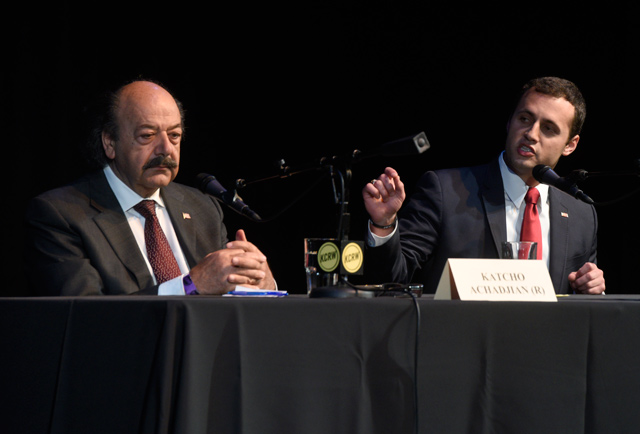
challenging establishment favorite Assemblymember Katcho Achadjian (left).
But he voted in favor of some legislation that supported women’s rights, including Senator Jackson’s Fair Pay Act and a bill that prohibited sex discrimination in the workplace. He also noted that the top executive at his gas stations is a woman.
Achadjian has a reputation for being pro-development rights. But according to Settle, he was not “the type who was banging on the table, saying, ‘I’m going to vote for every damn development.’ He wants to make sure everyone has had their say.”
Achadjian served four years on the California Coastal Commission and joined environmentally minded legislators who opposed the controversial firing of former executive director Charles Lester.
On the campaign trail, Achadjian voted to allow undocumented people to obtain driver’s licenses. But at a March forum, he said, “I don’t believe in amnesty. You need to earn it.” He also called for securing the borders and bringing back the guest worker visa, the Bracero Program of the ’40s.
On the campaign trail, Achadjian, now 65, seemed subdued, though recently he appears slightly more energized. At the first San Luis debate, he put on glasses to read from notes and admitted feeling “wobbly” after driving from Sacramento. His is a family-run campaign; daughter Nyri Achadjian is his campaign manager and has appeared in a TV ad contending her father supports women.
The district’s Republican establishment coalesced around Achadjian early, lobbying him to run. Achadjian said, “I was not planning on doing it, but opportunity knocked on my door.” An admitted workaholic, Achadjian said if he loses, he will go back to work at his gas stations.
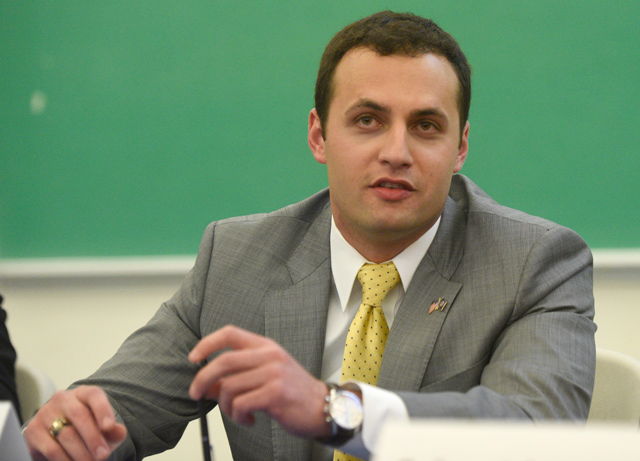
Justin Fareed
The youngest candidate in the race, Justin Fareed joked at a recent forum, “Everyone knows I’m 27 — I feel 28.” Fareed grew up in town, graduated from Santa Barbara High School, and went on to UCLA. He was on the football team, but a knee injury kept him on the bench a lot. His father, an orthopedic surgeon, started ProBand Sports, a medical device company located near Montecito. Fareed grew up packing boxes in his family’s garage when the business was small. It is now such a success that he was able to buy a $1 million condo in Goleta.
The political bug bit him in 2012, when he worked as a legislative aide to Kentucky Congressmember Ed Whitfield. After just 15 months, he left D.C., fed up with the dysfunction, he said. But the next year, he entered the 24th congressional race. “That same thing that motivated me to resign actually propelled me back into it,” he explained of his decision to get back into politics. He lost in the Republican primary to Chris Mitchum by just 614 votes, who in turn lost to Capps in the general election. In his campaign, Fareed hired the campaign manager of former Republican presidential candidate Governor Scott Walker, but she left the campaign in March. In 2014, he gave himself a $200,000 loan that he later forgave at the end of his campaign. Fareed has not loaned his 2016 campaign any money.
Asked in an interview in January who his political mentors are, he could not say. “I appreciate every interaction, whether it’s somebody at the restaurant, gas station, or somebody who is running a business,” he said, adding he likes ultra-conservative County Supervisor Adam, who endorsed him.
Some Republican establishment bigwigs encouraged Fareed to run for State Assembly, but he refused. His challengers criticize his lack of life and career experience, but he counters with, “There is absolutely not one candidate in this race who has developed a grassroots campaign from scratch.” In debates, he is verbose, and has a tendency to quarrel with the moderator.
Matt Kokkonen
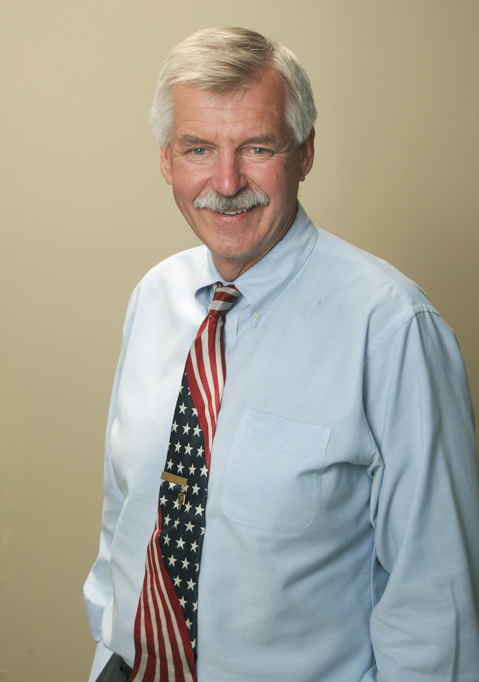
Matt Kokkonen is seen as the anti-immigrant immigrant. He landed in New York City at age 16 with one suitcase. Now he has two. “Only in America,” he jokes. A National Guard veteran, financial planner, and Westmont alum, Kokkonen’s rhetoric is far right, claiming that “gridlock is actually good because when Congress can’t agree on something, people are safe.”
In debates, the white-haired 71-year-old does not soften his language, saying recently he is “sick and tired of illegal aliens.” He called for mandates that employers use the e-verify program and stricter enforcement of current immigration laws. “We don’t have to deport the people who are here illegally; [they] will deport themselves,” he said in an interview.
Kokkonen, who gave $200,000 to his campaign, has run for state and federal office but has never been elected, though he has served on a number of commissions and boards.
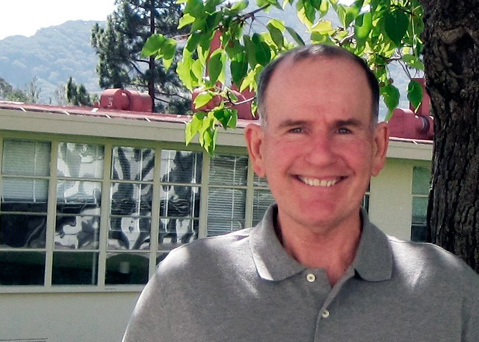
John Uebersax
John Uerbersax is the antiwar candidate. He grew up in the San Fernando Valley, where his dad worked for a space program, which made “definite impressions about what is possible.” He had a short stint at the think tank Rand. He objects to the two-party system, describing his political beliefs as “Jeffersonian.”
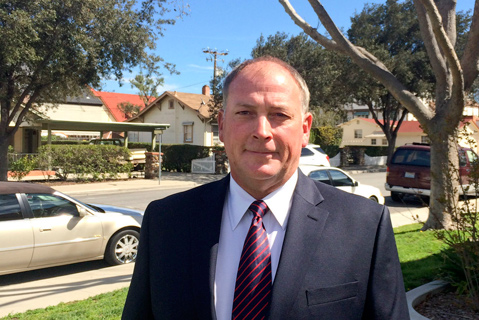
Benjamin Lucas
Born in Pennsylvania, Benjamin Lucas’s first job was cleaning up nuclear waste of Three Mile Island after the 1979 accident; his mom was a lobbyist for the nuclear industry. Six years later, looking for a modeling gig in Manhattan, he beat 7,000 people to become the first male Playboy bunny. Lucas has had a “Renaissance-type career.” Now a self-described “master carpenter,” he went to Bali and “sat in the jungle for a year and carved 16-foot, 3,000-pound white mahogany into Jim Morrison, John Lennon, Janis Joplin, and Jimi Hendrix.” He said, “I do what I’m going to say I’m going to do.” He considers himself a “Reagan Democrat.” Asked what chance he has to win, he said, “Slim.”
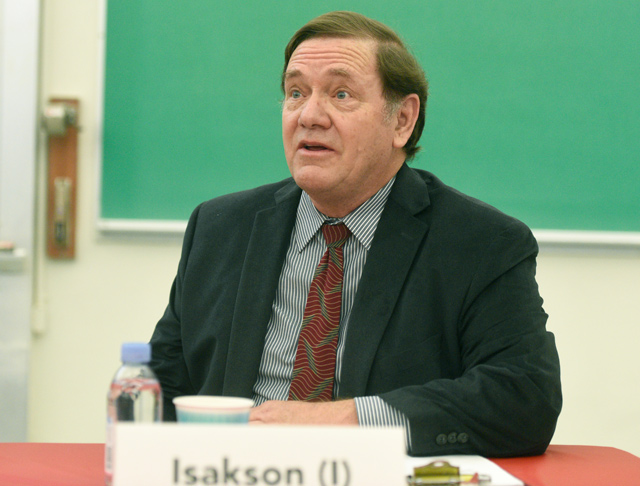
Steve Isakson
In high school, Steve Isakson won a sweater letter for chess. A longtime S.L.O. County resident, Isakson, 65, grew up in Oakland — his father was an electrician, and his mother a housewife. He studied computer science at Cal Poly and later obtained a doctorate in electrical and computer engineering from UCSB. He now works at the electronic manufacturing firm Rantec Power Systems.
Full disclosure: Last year, Independent Publisher Joe Cole contributed $1,000 to Carbajal’s campaign. In 2014, Carbajal appointed Cole to the Montecito Planning Commission. As always, Cole and the business department operates separately from editorial.



